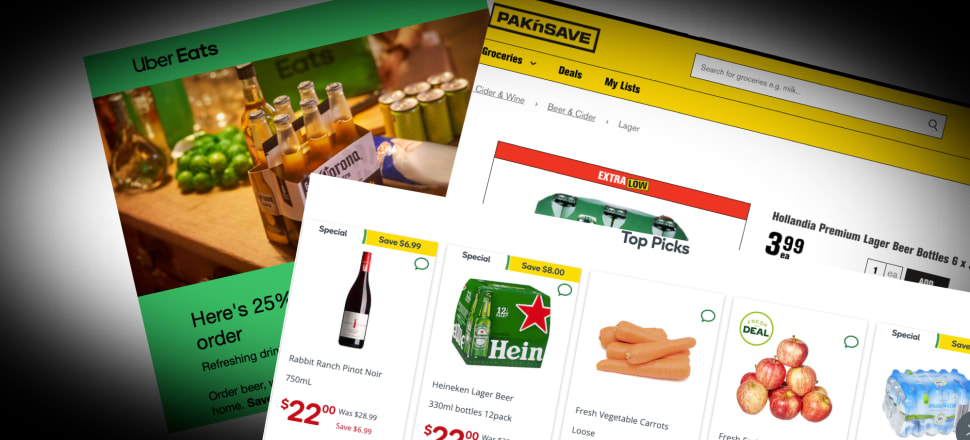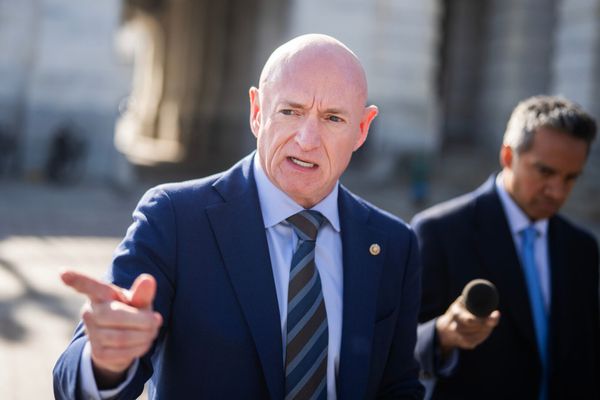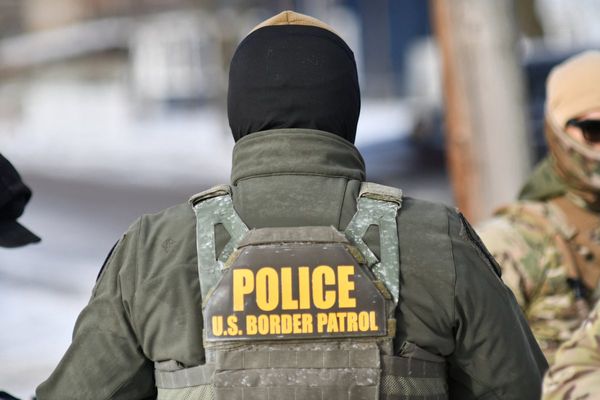
Prosecutions of big retailers over discounts of up to 68 percent on alcohol, as revealed by Newsroom, would be a groundbreaking test of the law on internet sales promotions.
Countdown, Foodstuffs and Uber Eats are all being interviewed by police, after a wave of heavy discounting of beer and wine that is worrying health experts.
Since Newsroom reported last week that Pak'nSave New Plymouth was selling six-packs of Hollandia lager for $3.99 – which works out at 67c a beer – another four deep discounts have come to light.
Foodstuffs has confirmed two other Pak'nSave supermarkets were offloading Hollandia that was nearing its best-before date, and acknowledged the prices were "incorrect" and had been withdrawn after Newsroom enquiries.
READ MORE: * Pak'nSave's 67c beers are 'simply irresponsible' * Rich Lister in new row over his aggressive alcohol sales * Small beer brands prepare to hike prices
In one of his last acts as associate justice minister, Aupito William Sio told Newsroom that selling a six-pack of alcohol cheaper than a six-pack of water in a socially deprived area was "simply irresponsible" on the part of any retailer. "We have to always consider the social impact and implications of this sort of targeted and aggressive alcohol marketing and promotion."
Countdown is promoting a "save $8.00" special on a dozen Heinekens, not just from its online shopping page but also its homepage. And on Friday and Saturday, Uber Eats sent out promotional emails to customers offering 25 percent discounts on beer, wine and spirits.
Inspector Hamish Milne, the manager of alcohol harm prevention at Police headquarters, confirmed the retailers were being interviewed. The supermarkets are licensed alcohol retailers, but Uber Eats is marketing the promotion on behalf of an unnamed licensee that it has declined to identify.
"The websites of remote sellers were not expressly included in subsequent amendments of the Sale and Supply of Liquor Act, so whether websites of remote sellers are exempt from the s237 offences has not subsequently been tested at law." – Insp Hamish Milne, NZ Police
Milne said Police had now begun an investigation into the alleged significantly discounted Hollandia beer at several Pak'nSave stores in the North Island, and were reviewing the cited Countdown beer discounts. "Police are also investigating the alleged Uber 25 percent discount on alcohol, including whether Uber merchant alcohol licence holders were a party to this promotion."
As these were ongoing investigations, he was not prepared to comment further on the specific allegations.
The Sale and Supply of Alcohol act makes it an offence, under section 237 on irresponsible promotion of alcohol, to market alcohol discounts of 25 percent or more below the ordinary price, except inside the store or in a catalogue or "similar price list".
"With the amount of alcohol harm, especially in communities saturated in liquor availability, the government owes it to those families to not just tinker around the edges." – Selah Hart, Hāpai Te Hauora
Experts say alcohol harm research indicates vulnerable communities, especially those who are dependent on alcohol, are more price sensitive and likely to be influenced by discounts.
Selah Hart, chief executive of health organisation Hāpai Te Hauora, said this online discounting showed the Government must accelerate its review of the Sale and Supply of Alcohol Act. "We need to ensure we are using this reform to get some hard-hitting safety measures over the line," she said.
"This reform is well overdue, and with the amount of alcohol harm, especially in communities saturated in liquor availability, the government owes it to those families to not just tinker around the edges."
Last year, Auckland Council's licensing inspector found that a chain of three wine stores owned by NZ Wine Organic Ltd had breached section 237 with its Facebook and Instagram promotions, but eight to 12 months had elapsed since the offending posts, so he was not able to take a case against the stores.
The question for any prosecution will be whether an online shopping site is a "similar price list" or whether it constitutes external advertising. That's not been properly tested.
"The websites of remote sellers were not expressly included in subsequent amendments of the Sale and Supply of Liquor Act, so whether websites of remote sellers are exempt from the s237 offences has not subsequently been tested at law," Milne said.
"As soon as we became aware of the short-dated product being sold for an incorrect price at the relevant Pak’nSave stores, we took fast action." – Emma Wooster, Foodstuffs
Uber Eats has thrown in the towel already on that legal point. Communications manager Bonnie Ko said: "Uber Eats can confirm that the promotional email that went out on Saturday was sent in error. As soon as the error became apparent, we corrected the promotion by email on Monday 6 February."
Ko said the safety and wellbeing of everyone that uses the Uber Eats app was always the company's priority, and Uber Eats was committed to promoting safe and sensible alcohol consumption. "We take this area seriously, and while we aren’t the first to offer this service in New Zealand, we will continue to build safety checks along the way to ensure responsible delivery and consumption of alcohol.”
The companies are well aware they sit on the edge of legal compliance – indeed, Countdown's national alcohol responsibility manager Paul Radich reveals he had to order an urgent fix to the company's website, just before Christmas, when he discovered its alcohol sales discounts were showing up on Google searches.
"We had massive issues with that prior to Christmas. So I suspended all of Google's scraping and changed what access Google had to our website," he told Newsroom. "I'm as confident as one can be."
"I believe unintended consequences have been achieved by eroding market competitors and leaving only two nationwide companies retailing beer and wine with any form of grocery or top-up shop." – Matthew Lane, Night 'n Day
He expressed confidence that the company's alcohol promotions remained on the right side of the law, because Countdown's homepage was part of its online shopping site.
"We've spent quite a lot of time with councils and the Police and the Ministry of Health and all have agreed that if you're going to do it, that's the place where you're legally allowed to do it," he said.
"We've gone to some considerable lengths to talk to all of the regulatory agencies, unlike Pak'nSave and Uber, who they are taking to task."
James Radcliffe, the general counsel for Countdown's parent company Woolworths NZ, added that the supermarket chain took its responsibilities as an alcohol retailer seriously. It worked with a number of stakeholders, including Police and local councils, to ensure its approach to the sale and promotion of alcohol complied with all relevant legislation.
"We also regularly perform internal compliance checks to ensure that any issues or concerns are quickly identified and addressed," he said. "We haven’t had any concerns raised about our alcohol discount advertising. We’d invite anyone who does have a concern to reach out."
"The game has changed with new retailers such as Uber Eats and the speed at which alcohol can be obtained... You could be too intoxicated to be served by a licensed premise, but order your next box of beers to your house within an hour." – Rebecca Williams, Alcohol Healthwatch
Foodstuffs spokesperson Emma Wooster has admitted the prices Pak'nSave supermarkets were selling Hollandia lager for were "incorrect" and the company had moved quickly to pull the product from sale in some stores, or fix the pricing in others.
“We’re committed to the safe and responsible sale and supply of alcohol at our stores," she said this week. "Recently it came to our attention we had some short-dated beers that had led to instore pricing being set lower than it should have been.
"As soon as we became aware of the short-dated product being sold for an incorrect price at the relevant Pak’nSave stores, we took fast action, and the instore and online prices were either corrected to the normal retail price or the product was removed from sale.”
Supermarkets use alcohol for 'competitive advantage'
With more than 50 stores, the family-owned convenience store chain Night 'n Day is the country's third-biggest groceries retailer after Foodstuffs and Woolworths – which highlights the gap between the frontrunners, and third place.
General manager Matthew Lane said the sale of alcohol had changed significantly since the Sale and Supply of Alcohol Bill was introduced in 2010, with the explosion of online sales. "I believe unintended consequences have been achieved by eroding market competitors and leaving only two nationwide companies retailing beer and wine with any form of grocery or top-up shop," he said.
Lane argued that the prominence of alcohol in supermarkets had increased over time. "Many supermarkets have it visible as soon as you enter the premise. Low everyday prices are often used to attract customers to stores and even serve as a wholesale market for cafes and restaurants.
"If someone wants wine, cheese and crackers there are only two companies they can source this from in one shop. It may not be anti-competitive but it certainly creates a competitive advantage over any growing competitor or one entering the market."
"Alcohol is being aggressively marketed and promoted online by a range of providers and reaches youth without any constraints." – Dr Grant Hewison, Communities Against Alcohol Harm
The rules on alcohol licensing meant the two big supermarket chains were able to open even small grocery stores and be granted alcohol licences, but competitors couldn't get alcohol licences because they couldn't access enough food to be deemed a grocery store. With Countdown and Foodstuffs controlling the grocery supply chains, only three Night 'n Day stores have been able to access sufficient food products to be deemed grocery stores for licensing purposes.
"Without competitive wholesale it increases retail pricing, reducing grocery volume and removes the ability to obtain a liquor licence," Lane said. "They have blocked grocery sales in the market and subsequently left themselves as the only on-licence that caters for a main or top-up shop."
Health groups welcome police probe
Alcohol Healthwatch highlighted particular problems with remote online sales that it said were of "huge concern" for those trying to minimise alcohol harm.
First, said acting director Rebecca Williams, the only controls on under-age drinkers buying alcohol are a couple of online tick boxes declaring they are aged over 18, and the delivery person. "In reality, we often hear of it being delivered and then just left at the door, where anyone can pick it up," she said.
Secondly, the speed at which alcohol could now be delivered: "You could be too intoxicated to be served by a licensed premise, but order your next box of beers to your house within an hour. Online sales are contributing to the high rates of harm in New Zealand, and this affects everyone – our kids, neighbours, and community."
Those examples showed that the existing legislation simply wasn’t designed to handle today's online world, she said. "The game has changed with new retailers such as Uber Eats and the speed at which alcohol can be obtained. The whole Act urgently requires comprehensive review to ensure it’s up to scratch for reducing the harm from New Zealand’s most harmful drug."
"Clearly the supermarkets and other retailers can't be trusted to follow the letter of the law regarding the sale of alcohol." – Lotta Dann, Living Sober
Lawyer Dr Grant Hewison, from Communities Against Alcohol Harm, said the online marketing and sale of alcohol was a significant and growing problem, especially in New Zealand's most vulnerable communities.
“Alcohol is being aggressively marketed and promoted online by a range of providers and reaches youth without any constraints," he said.
"The problem has clearly been identified by alcohol inspectors, the Police and Medical Officers of Health over a number of years. It became far more of an issue during the lockdowns of Covid-19."
He said the Sale and Supply of Alcohol Act did need to be updated, but even within the existing law there were powers for Police to prosecute that extended to irresponsible promotions made online.
Lotta Dann, a recovery advocate and manager of the Living Sober online community, argued the discounting showed the law wasn't fit for purpose.
"It's fantastic that police are chasing this, although it's a shame they have to waste resources doing so when they're already so busy dealing with the widespread harm that's being caused by this drug," she said.
Online sales had increased the opportunity for sellers to push their products and increase their profits, she said. "Clearly the supermarkets and other retailers can't be trusted to follow the letter of the law regarding the sale of alcohol."







